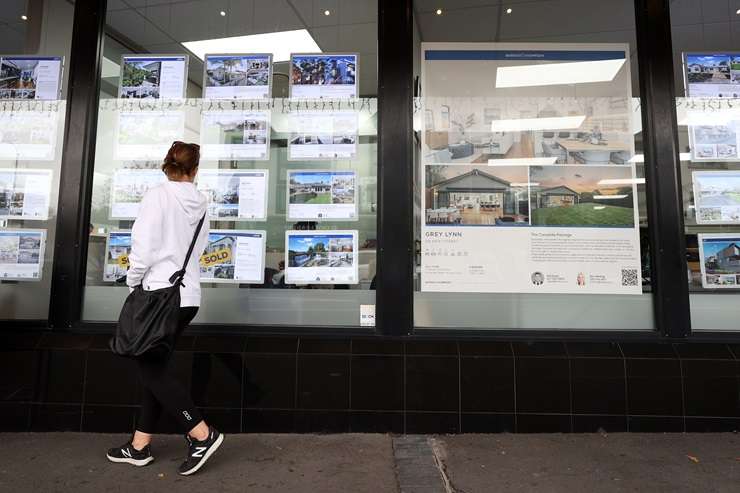It was a tough year in real estate. It started well but flagged in the middle, earning a variety of adjectives from the experts, from soggy to underwhelming.
The year began with a slight upturn - in listings and market confidence - but job losses and low confidence remained part of the picture for much of 2024.
Buyers were presented with a lot of choice with a surplus of stock up for grabs, some of it from people selling up because they were not coping with the high interest rates, and others who were upping sticks and leaving for Australia.
In some price brackets, houses sat on the market for months on end as buyers waited for the interest rates to drop, which they finally did but not by much.
Start your property search
By the year end, there was a little more cheer around interest rates, and agents and economists interviewed by OneRoof thought next year would be better.
There was one standout buyer group during the year, however. Kelvin Davidson, chief economist for CoreLogic NZ, called 2024 the Year of the First-Home Buyer.
Discover more:
- Revealed: The hot 100 New Zealand suburbs to watch in 2025
- NZ’s top 60 real estate agents keep setting records despite downturn
- Hey big spenders! 2024's biggest house sales revealed
“Certainly, their market share at our numbers has been at record highs – 27%, that’s a record. At some points in the past, it’s been below 20%.”
But Davidson said the year overall was underwhelming. There were a couple of percentage points of growth in the first few months but by September it was around -4%.
Job losses started to come through in February and March, the hoped-for interest rate cuts did not come and activity levels were low.
“I guess reality kind of hit again. Properties haven’t really been changing hands, since sales volumes are really low. In a low turnover environment, you don’t tend to see big booms in house prices.”
Mortgage rates falling was key to recovery, with Davidson saying that would be the main reason the downturn would likely end soon.
“Interest rates can have a pretty strong impact, and a pretty sudden impact.”
That did not mean there would be a new boom, though. People were still losing jobs, there was stretched affordability and there were a lot of listings to pick and choose from.
While Davidson expected next year to be better for the housing market, the introduction of Debt-to-Income Ratios (DTIs) could limit house price growth.
Turning point
ASB chief economist Nick Tuffley’s adjective of choice for the year was soggy, saying any momentum from late 2023 soon fizzled out.
Population growth had been strong last year, and the Reserve Bank had signaled it was done with interest rate rises but a short-term flurry early in 2024 quickly died away and talk turned instead to the possibility of interest rates going higher again.
Sales turnover flattened with more listings coming on the market leading to “soggy” prices through the middle part of the year, and stock sat around for longer than usual.
However, with the Reserve Bank since signaling the start of an easing cycle, confidence should begin to pick up, as well as sales, he said.
Tuffley expected prices to be stronger next year with the ASB picking around 10% growth.
Kiwibank chief economist Jarrod Kerr also said falling interest rates would be the game changer.
“That’s the turning point. We can sort of put the flag in the ground and say ‘hey, this is the bottom’.”
Investors, who had been “hunted by policymakers”, should begin to recover. Kerr said Kiwibank’s lending to investors this year was less than to first-home buyers and that was “extraordinary”.
“Normally investors are three, four times the size of first-home buyers so that’s a big shift.”
In the coming months there should be a lot more signs of life across the board, he said.
“We’re still forecasting 5% to 7% growth in house prices next year. After a 20% fall, that’s a recovery of some description.”
Housing crisis
Job losses, however, did not help that picture and on a regional basis Wellington was the worst performing region.
“They are recording two out of 10 on the Kiwibank economic score which is pretty miserable, and that’s following a miserable two out of 10 last year.”
Auckland scored three out of 10 at the time of writing, and the South Island was mostly fours.
This time next year, however, Kerr expected improvements, from threes and fours to potentially fives and sixes.
Future improvements aside, the housing crisis was still a long way from being solved and may have gone backwards this year because falls in house prices made it hard for developers to develop, he said.
The underlying problem was lack of infrastructure spending still restricting building: “There is a chronic shortage of housing because we have underinvested for decades – that story hasn’t changed.”
Kerr said a solution would be to take infrastructure out of Government hands and into an infrastructure fund so work could be consistent and outside three-year election cycles.
“We need people with the ability to think long-term and deliver long-term. They should be thinking in 15/30-year chunks, not three-year bites.”

Kiwibank chief economist Jarrod Kerr: “We’re still forecasting 5% to 7% growth in house prices next year. After a 20% fall, that’s a recovery of some description.” Photo / Supplied

2024 was the year of the first-home buyer, but the group's dominance is likely to be challenged in 2025. Photo / Fiona Goodall
Wayne Shum, senior research analyst for Valocity, OneRoof’s data partner, said the year had been subdued with early optimism not panning out.
The Reserve Bank’s talk about keeping the OCR high for longer to combat inflation meant the banks kept interest rates high, keeping the market flat, however, he, too, said next year should be better.
Shum expected transaction numbers to improve, although said that might not translate to immediate price increases.
“We’re still a long way away from those fixed offers-on-the-table-by-the-first-weekend situations that we saw in 2021.”
And people may still hold off their housing plans as the interest rate lowering cycle had only really begun.
“They know it’s going to come down further, there’s no urgency at the moment, there’s plenty of supply out there. There’s no urgency for anyone to act just yet.”
First-home buyers dominate
Shum said last year’s change of Government had not had much impact on the market. The promised change to the foreign buyer ban did not happen and while the bright-line test was brought back to two years at the end of June it did not lead to investor-owned houses flooding the market.
In September came news the GDP was down 2%, and redundancies and job losses had flow-on effects, such as hospitality not doing well and restaurants and cafes closing.
Sanjeev Jangra, an advisor with Loan Market who deals mainly in South Auckland, said his year was a busy one regardless of market conditions and that was largely down to first-home buyers.
He had gone overseas around New Year’s Eve, hoping things would be quiet but his phone started ringing with people wanting loans.
He put that down partly to New Year’s resolutions, and partly down to hope, because at the start of the year people thought the bottom had been reached and there was hype interest rates could fall.

Infomterics CEO Brad Olsen: "It’s a soft market – it’s been a soft sort of year.” Photo / Mark Mitchell
But the market went flat by March and April when people realised that was not happening, Jangra said a lot of people put their homes on the market ahead of their mortgages coming up for renewal only to find few buyers.
He also had to deal with clients who had already been approved for loans losing their jobs, many of them in the Government sector, so not being able to proceed with their house-buying dream.
“Government contractors have been contracting for 10-plus years and on a really decent income and all of a sudden have nothing.”
Pockets tightened across the sector – Jangra said Facebook marketplaces had builders selling their tools because they were out of work.
By September, though, investors were back, looking for a bargain, and property flippers were active.
More pain to come
Infometrics principal economist Brad Olsen said the year saw a lot more stress and pressure on mortgagors, as evidenced by the higher levels of properties for sale.
People could see they would struggle so adjusted their own position before it was forced on them, he said.
And, while technically a buyer’s market, there were a limited number of people able to get a mortgage to buy a house.
Even with lending easing there were still plenty of concerns around job security and the economic landscape in the year ahead. Olsen said Infometrics expected the unemployment rate to climb to 5.3% next year so further pain was to come.
“A lot of thinking this year has been when is the pickup going to begin and we think the pickup is still a little bit more limited, or at least a little bit more restrained, than others seem to be expecting.”
That was because as interest rates start to come down, debt to income limits would start to bite.
Population growth had also slowed compared to last year, but a lot of houses built in the last couple of years were coming online, so unless there was a massive jump in buyer numbers the recovery was likely to be soft.
“It’s a soft market – it’s been a soft sort of year.”
Agents also reported a challenging year of blood, sweat and tears, even at the higher brackets.
Linda Galbraith, from Barfoot & Thompson Parnell, said the general consensus was it had been an interesting but hard year with some agents she knew describing it as “diabolical”.
The country would crawl out of the doldrums but vendors would need to be realistic about prices, she said.
Everyone was holding out for the OCR to come down another 50 basis points so buyers could borrow more, and for the foreign buyer ban to be overturned, which she said had been a persistent rumour throughout the year – if both of those things happened the market might start to move again.
- Click here to find properties for sale



















































































